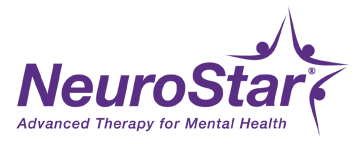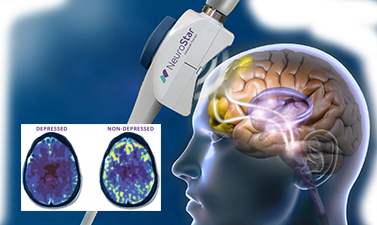
Modern Mind Clinic provides TMS (Transcranial Magnetic Stimulation) therapy for patients in Detroit and Wayne, Oakland, Macomb Counties: offering the latest in depression treatment using the Neurostar® TMS therapy system. Transcranial Magnetic Stimulation therapy is one of the most technologically advanced depression treatments available and has helped thousands of depression patients. This non-invasive, outpatient therapy is FDA cleared and insurance reimbursed.
Clinical trials have demonstrated the safety and effectiveness of NeuroStar® TMS Therapy in treating patients who have not benefited from prior antidepressant medication. NeuroStar TMS Therapy was studied in adult patients suffering from Major Depressive Disorder, all of whom had not received satisfactory improvement with previous treatments.
Non invasive and non systemic. The only side effect is the possible minor irritation of the scalp.
TMS is a non-drug treatment, people don’t experience side effects like those associated with antidepressant medications.
When reported, side effects were minor and include mild headache, mental fatigue and discomfort at the treatment site.
Magnetic energy similar to what is used in an (MRI) is used to stimulate the areas of the brain that are sluggish and causing depressed mood.

Major depressive disorder is a condition which lasts two or more weeks and interferes with a person’s ability to carry out daily tasks and enjoyed activities that previously brought pleasure. This condition affects approximately 16 million American adults, or about 6.7 percent of the U.S. population age 18 and older.1
The exact cause of depression is not known, but leading research in Neuroscience points to an imbalance in the brain’s neurotransmitters as the manifestation of depression. Neurotransmitters are chemical messengers that send signals between brain cells. A person’s genetic make-up and life history may also determine a person’s tendency to become depressed.
In 2016 a study conducted by the Center for Behavioral Health Statistics and Quality reported that major depressive disorder will affect approximately 16 million American adults (about 6.7% of the US population) in a given year. 1
Yes. The National Institute of Mental Health maintains that, “Depressive illness can often interfere with normal functioning and cause pain and suffering not only to those who have the disorder, but to those who care about them. Serious depression can destroy family life as well as the life of the ill person.” A national study of depression found that nearly all the respondents who reported a major depressive disorder also reported that their social and/or work lives were negatively affected by their illness.1 In 2010, the economic burden of depression was estimated at $210 billion in the US2 and depression was the second leading cause of disability, accounting for almost 20% of all years of life lost to disability and premature death.3 Depression can also be a lethal disease. Each year in the US, over 30,000 people die by suicide, 60% of whom suffer from depression.4, 5
There is no known cure for depression but with effective treatment, many patients can remain symptom free.
TMS stands for transcranial magnetic stimulation. It is used to treat depression by stimulating the brain non-invasively using electromagnetic fields, similar to those produced by an MRI machine. During NeuroStar Advanced Therapy TMS, a magnetic field is administered in very short pulses to the part of the brain that research has demonstrated to be associated with depression. The typical initial course of treatment is about 19-37 minutes daily over 7 weeks.
No, the most common side effect related to treatment was scalp discomfort during treatment sessions. This side effect was generally mild to moderate, and occurred less frequently after the first week of treatment.
If necessary, you can treat this discomfort with an over-the-counter analgesic. If these side effects persist, your doctor can temporarily reduce the strength of the magnetic field pulses being administered in order to make treatment more comfortable.
Less than 5% of patients treated with NeuroStar Advanced TMS Therapy discontinued treatment due to side effects.
Wayne, Oakland, Macomb, Kent, Genesee & Washtenaw Counties in Michigan
Copyright 2024 Modern Mind Clinic. All Rights Reserved.
Indication
NeuroStar Advanced Therapy is only available by prescription. A doctor can help decide if NeuroStar Advanced Therapy is right for you. Patients’ results may vary. The NeuroStar Advanced Therapy System is indicated for the treatment of depressive episodes and for decreasing anxiety symptoms for those who may exhibit comorbid anxiety symptoms in adult patients suffering from Major Depressive Disorder (MDD) and who failed to achieve satisfactory improvement from previous antidepressant medication treatment in the current episode. The NeuroStar Advanced Therapy system is intended to be used as an adjunct for the treatment of adult patients suffering from Obsessive-Compulsive Disorder (OCD). Visit neurostar.com for full safety and prescribing information.
Important Safety Information
The most common side effect is pain or discomfort at or near the treatment site. These events are transient; they occur during the TMS treatment course and do not occur for most patients after the first week of treatment. There is a rare risk of seizure associated with the use of TMS therapy (<0.1% per patient). NeuroStar Advanced Therapy should not be used with patients who have non-removable conductive metal in or near the head. NeuroStar Advanced Therapy has not been studied in patients who have not received prior antidepressant treatment.

Please check with our office if you don’t see your insurance